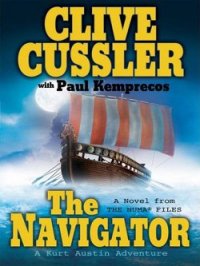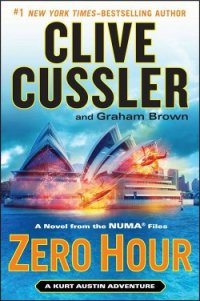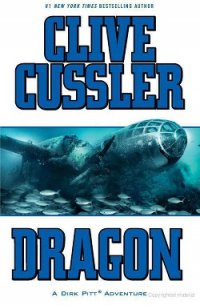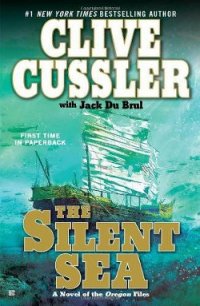White Death - Cussler Clive (читать полностью книгу без регистрации .txt) 📗
Austin crawled back into the Lamprey. "Mission accomplished," he said.
"Turning on the can opener," Zavala said. He hit the switch for the ring of cutting lasers. They sliced through the two-inch metal skin as easily as a paring knife through an orange. A monitor showed the penetration and the brilliant red of the lasers. The lasers automati- cally shut off.
Petersen had been watching as a faint pink circle deepened in color until it was a bright molten reddish-orange. He felt welcome heat against his face. There was a hollow clang as a section of the hull fell into the cabin, and he had to shield his eyes against a bright disk of light.
Steam filled the escape tunnel, and the edges of the opening were still hot from the laser cutters. Austin pushed a specially made lad- der over the rim and stuck his head through the opening.
"Any of you gentlemen call a taxi?" he said.
Despite his lighthearted manner, Austin wondered if the rescue was too late. He had never seen such a bedraggled bunch. He called out for Captain Petersen. A grease-covered apparition crawled for- ward and croaked, "I'm the captain. Who are you?"
Austin climbed into the ship and helped the captain to his feet. "The introductions will have to wait. Please tell your men who can still move to crawl through that hole."
The captain translated the order. Austin threw a couple of soggy blankets onto the rough edges of the opening, then helped those who couldn't make it under their own power. Petersen collapsed as he was trying to crawl into the submersible, and Austin had to give him a shove, then clambered in behind him. As he entered the air lock, he saw water trickling in through the rim of the seal where Zavala had done a hasty patch job.
He quickly closed the hatch behind him. Zavala had put the con- trols on auto while he pulled the crew through the air lock. The bulky survival suits didn't make the task any easier. It was a miracle that any of the crew was still alive. Amazingly, some had made the trip themselves. The passenger space consisted of two padded benches running the length of the sub, separated by a narrow aisle. The survivors crowded onto the benches or stood in the aisle like commuters on a Tokyo subway.
"Sorry there's no first-class section," Austin said.
"No complaint," said the captain. "My men will agree that it is bet- ter than our former living arrangements."
With the crew settled, Kurt returned to the cockpit. "We had a lit- tle leakage around the seal," he reported.
Zavala indicated a blinking light on a computer-generated dia- gram of the submersible. "More than a little. The 0-ring blew out like a flat tire a second after we closed the air lock."
He retracted the telescopic escape tube, disengaged the sub- mersible from the dead ship and backed off, clearly revealing in its floodlights the round hole where the lasers had cut out the escape route. When the sub was clear of the wreck, he activated the ballast pumps. The electric motors clicked into action with a low hum, ex- cept from the front right pump, where there was a sound like a fork going down a garbage disposal. One ballast tank still had water in it, disrupting the sub's equilibrium as the others filled with com- pressed air.
The Sea Lamprey operated like any other submarine; it pumped water into its ballast tanks to dive, pumped in air to ascend. The computer tried to compensate by giving more power to the vertical thrusters. The submersible lurched into a nose-down angle, and the smell of hot metal came through the vents. Zavala pumped water back into the other tanks, and the Lamprey leveled out, more or less.
Austin stared at the instrument panel. A light was blinking on a schematic troubleshooting diagram. He ran a check on the computer that served as the brains of the vehicle. The trouble system indicated that the warning light had been triggered by an actual mechanical problem, the kind of glitch that could show up with new equipment, and was probably easily repairable. But this was not a test run; it was a deep submergence dive to fifty fathoms. Another light started blinking red.
"Both front motors are gone," Austin said. "Better use the backup pumps."
"Those were the backup pumps," Zavala said.
"So much for redundant systems. What's the problem?"
"I could tell you in a minute if I had this thing up on a lift."
"I don't see any garages nearby, and in any case, I forgot my credit card."
"As my father used to say, 'All it takes to move a stubborn burro is a stick of dynamite.5 " Zavala said.
Around the halls ofNUMA, Austin had a well-deserved reputa- tion for having an unflappable stubbornness in the face of adversity. Most men wisely cut and run in the face of sure disaster; Austin faced it with equanimity. The fact that he was still alive and breathing showed that he possessed a remarkable combination of resourceful- ness and luck. Those who'd had to tough it out with him found his serendipity frightening. Austin always shrugged off their complaints. But now, Joe was giving him a taste of his own medicine. Austin compressed his lips in a tight smile, laced his fingers behind his head and sat back in his seat.
"You wouldn't be so relaxed if you didn't have a plan," Austin said.
Zavala gave his partner an exaggerated wink and removed the two-pronged key that had been hanging from a chain around his neck. He flipped open a small metal cap in the center of the console and inserted the key. "When I turn this key and flick the little switch next to it, the third redundant system comes into play. Explosive charges will blow off all the ballast tanks, and up we go. Smart, eh?" "Not if the Thor is in the way when we come flying out of the
water. We'd sink the ship and us."
"If it makes you feel any better, press that button. It sends up a warning buoy to the surface. Flares, whistles. The whole nine yards."
Austin punched the button. There was a swoosh as the buoy was ejected from the sub. He advised their passengers to hold tight.
Zavala jerked his thumb skyward, a boyish grin on his face.
"Going up" He hit the switch and they braced themselves. The only sound was Zavala swearing under his breath in Spanish. "The switch didn't work," he said with a sheepish grin.
"Let's see if I can summarize this. We're three hundred feet down, with overloaded capacity, the cabin full of half-dead sailors, and the panic button doesn't work."
"You have a knack for brevity, Kurt."
"Thanks. I'll expand further. We've got two front tanks full of water, two rear ones empty, and that spells neutral buoyancy. Any way of lightening the Lamprey?"
"I can jettison the connector tube. We'll get to the surface, but it won't be pretty."
"Doesn't seem we have much of an alternative. I'll tell our pas- sengers to hold on."
Austin made his announcement, buckled himself into his seat and gave the signal. Zavala crossed his fingers and blew off the rescue tube. It had been made detachable as a precaution, in case the sub- mersible had to extricate itself from a rescue in a hurry. There was a muffled explosion, and the submersible lurched. The Sea Lamprey rose a foot, then a yard, then several yards. Their progress was ex- cruciatingly slow at first, but the craft gained more speed the higher it went. Before long, it was speeding to the surface.
The Sea Lamprey exploded from the sea stern-first and splashed down in a fountain of white water. The vehicle rolled violently, toss- ing those inside around like dice in a shaker. Alerted by the warning buoy's sound-and-light show, small boats dashed in and their crews attached pontoons that stabilized the craft in a more or less horizon- tal position.




